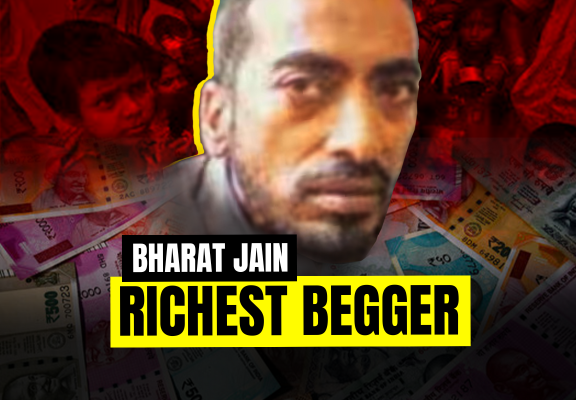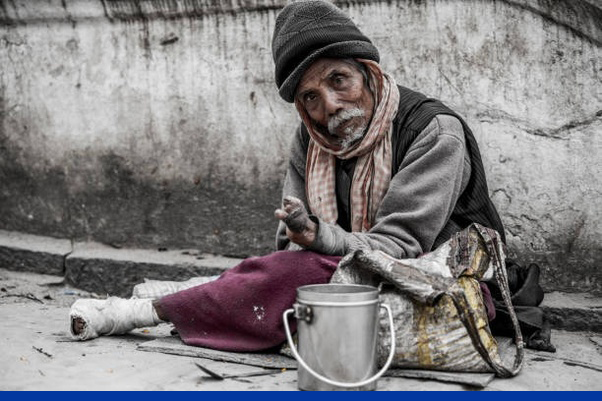
There are a lot of different storylines that make up India’s social and economic history. A paradox that sticks out in the narrative of Bharat Jain is the fact that he started out as a beggar and eventually became the wealthiest beggar in the country. Despite the fact that this narrative appears to be about inspiration, there is actually a complex network of power, exploitation, and societal negligence beneath the surface. Today, we are going to take a more in-depth look at Bharat Jain’s journey, which prompts us to contemplate the ways in which we extol the virtues of riches while accepting the brutal reality of begging in India.
Is this a business opportunity?
In his stories, Bharat Jain’s climb from poverty to prosperity is sometimes idealized, giving the impression that he was an ambitious, self-made man who triumphed over the challenging circumstances he faced. When one examines the matter more closely, however, a more sinister reality becomes apparent: a vulnerable individual who is caught in a cycle of poverty is being used. It is possible that Bharat’s commercial endeavors have made him wealthy; yet, they have also maintained a system that continues to profit from exploiting those who are vulnerable. There is no confirmation, but it is said that he has employed around 18,000 beggars who beg for him and give him a percentage of what they earn. In return, he provides them shelter, food and healthcare.
Stereotype Maintenance
Recognizing Bharat Jain as the “richest beggar,” we unwittingly foster negative views about being poor and trying to make ends meet through begging. Rather than addressing the structural issues that force people to resort to begging in order to exist, we choose to view their struggles as a means of providing us with motivation. Not only does this narrative make begging appear less human, but it also absolves society of responsibility for addressing the issues that lead to poverty and injustice.

Philanthropy Fallacy
Even though the humanitarian activities of Bharat Jain are wonderful, they are not able to conceal the fact that India is still impoverished as a result of the inequalities that are embedded in the system. Despite the fact that he may provide assistance to a few individuals who are in need for a brief period of time, his efforts do not effectively address the structural issues that keep millions of people trapped in cycles of poverty. If you want to be considered generous, it is not enough to simply donate money to worthy charities; you must also be concerned about bringing about systemic change and advancing social justice. Furthermore, in spite of the fact that he is extremely affluent, Jain continues to beg on the streets of the bustling financial capital. People typically only make a few hundred rupees even after working long hours, but Jain is able to make ₹2,000 to 2,500 per day in just ten to twelve hours because of the generosity of others.
Note to Remember
The narrative of Bharat Jain forces us to confront inconvenient truths about the wealthy, the impoverished, and the privileged people of India. Rather than focusing on straightforward accounts of triumphs and defeats, it encourages us to engage in in-depth contemplation of the structures that exist within our society that perpetuate injustice. As we relish Bharat’s journey, we must not overlook the millions of individuals whose stories remain untold. People like this are unable to escape their poverty and have no way out.
Even though he came from nothing, Jain has a net worth of ₹7.5 crore. Between ₹60,000 and ₹75,000 a month, he makes by begging. A 2BHK apartment in Mumbai worth ₹1.2 crore is also his. He also owns two shops in Thane that rent for ₹30,000 a month. People say that Jain begs in public places like Azad Maidan or the Chhatrapati Shivaji Maharaj Terminus train station (CSMT). For your information he is not alone in this kind of journey, There are many rich beggars in India like Shambhaji Kale with a net worth of around ₹1.5 crore and Laxmi Das with a net worth of around ₹1 crore.
Conclusion
In light of the fact that India’s social and economic situation is so difficult, the narrative of Bharat Jain serves as a potent warning. It is possible that his journey will inspire feelings of awe and adoration in you, but it will also cause you to reflect on yourself and evaluate it critically. In the process of figuring out how to address the complex problems of poverty and wealth in India, let us work toward creating a society that is more equitable, one in which everyone has the opportunity to flourish rather than merely survive. When this occurs, we will be able to properly honor the power and value of individuals such as Bharat Jain, whose experiences are difficult to categorize in a straightforward manner.
I believe that if you are poor and beg for a living, it is a priority that once you have enough money to start something to earn for a living, you must take a step out of begging. But people like Bharat Jain are so materialistic that even after having so much wealth, he thought, Why not make begging a profession and employ other people so that he can become more rich?





